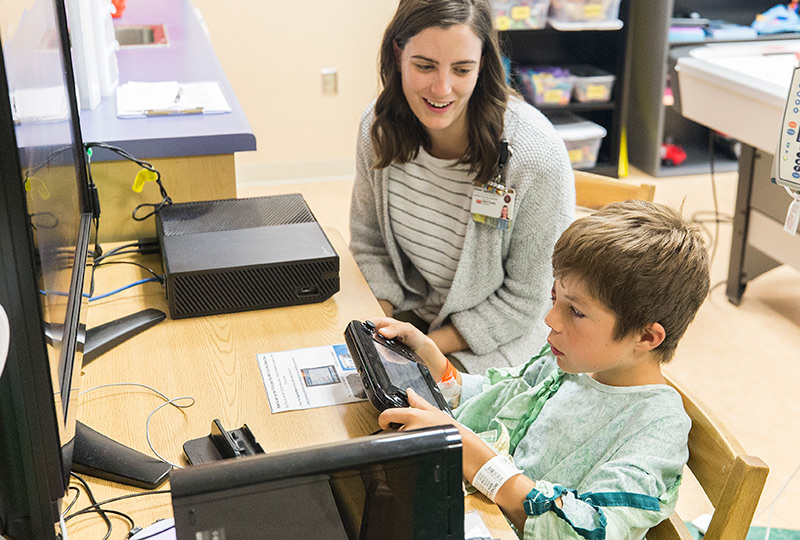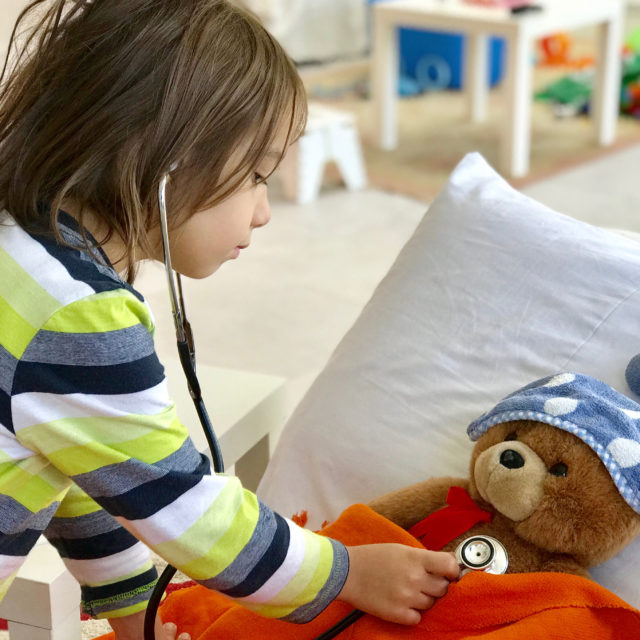These experts help children feel calmer when they’re in the hospital.
I am a child life specialist. That means I tell children, using their language, what is going to happen to them while they are at the hospital. I ease their worries and fears by engaging them in conversation and play. But child life specialists do more than just play.
A recent incident demonstrates the role a child life specialist can play when families are dealing with a hospital visit.
I was paged by our orthopedic cast technicians to meet a child who was screaming in the waiting room of the clinic. Both parents were present when I met their child. Seeing how upset the boy was (screaming still), I asked to go into a private room where I could get to know him before the technicians removed his splint to cast his arm. I introduced myself and my role to the child and his parents, then started blowing bubbles with the boy while gathering information from his parents about previous medical experiences.
I learned that this was his typical behavior at any doctor’s office visit. His parents didn’t know why he became so upset. I prepared him for the removal of his splint and the placement of a cast on his arm. He maintained eye contact, listening — while screaming sporadically — and popping bubbles. I encouraged his parents to use comfort positioning. (Comfort positioning means seating the child on the parent’s lap, chest-to-chest or back-to-chest.) They agreed this would help him remain calm during the process.
Right before we started, between screams, the boy asked, “How many shots do I get now?”
I gently told him he was not receiving any shots, and reminded him of what to expect during the splint removal and the casting. After learning that he was not receiving any shots, the boy played with the bubbles, sitting on his mother’s lap as the splint was removed and his arm was casted. When that was done, he hopped down from the exam table and was ready to accept his sticker and have friends sign his cast.
Before this family left, I gave the parents tips on how to prepare their son for future medical visits, encouraged medical play, and stressed the importance of telling their child the truth about what will happen during doctor’s appointments.
There are many situations that call for help from a child life specialist. Here are five good reasons to call:
1. The first visit.
A child’s first visit to the clinic or hospital may be for a routine exam, treatment for an injury or a painful or stressful procedure (shots, starting an IV, casting, learning about a parent’s accident or death, etc.). A child life specialist will build rapport and consequently trust through normalization and play.
2. Upcoming procedures that require preparation.
Child life specialists teach parents how to support their child during a procedure using comfort positioning; normalizing the environment through play; and preparing the child for what they are going to experience. This preparation helps the child cope with the procedure and set a positive tone for future medical visits.
3. Follow-up visits after a scary experience.
Signs of poor coping may include the child clinging to you; crying at the sight of a nurse or doctor; or hiding under the chair. Medical play helps children become more familiar with the hospital surroundings and helps them cope with their visit by letting them play with common medical items such as stethoscopes, bandages, doctor’s hats, masks and gloves. Medical play is a way for child life specialists to clarify any mistaken ideas or expectations the child may have about the clinic, the hospital or their treatment.
4. Coping with a new diagnosis or serious illness.
Child life specialists help your child and any siblings process this information by explaining the diagnosis in a way the child can understand. It can be difficult for parents to find the words to explain what’s happening to the child while absorbing the information themselves. The child life specialist works with families to provide clear, simple, non-threatening information. This prevents the children and siblings from imagining scarier explanations of the diagnosis. Depending on age, some children want more information than others. All children wonder why they need tests, hospitalization or medicine.
5. Losing a loved one.
Child life specialists can help parents when they are faced with telling their children this tough news. We can suggest age-appropriate language to describe death and dying, and provide tools to help the child process the loss. The child life specialist can provide clear, simple information to prevent confusion. Children process this information differently depending on age. Child life specialists can also provide your child with activities that help them express themselves, cope with the loss and find ways to honor their memories of the person they lost.
This post was written by Stephanie Hegel, a certified child life specialist at Monroe Carell Jr. Children’s Hospital Vanderbilt at Williamson Medical Center.





